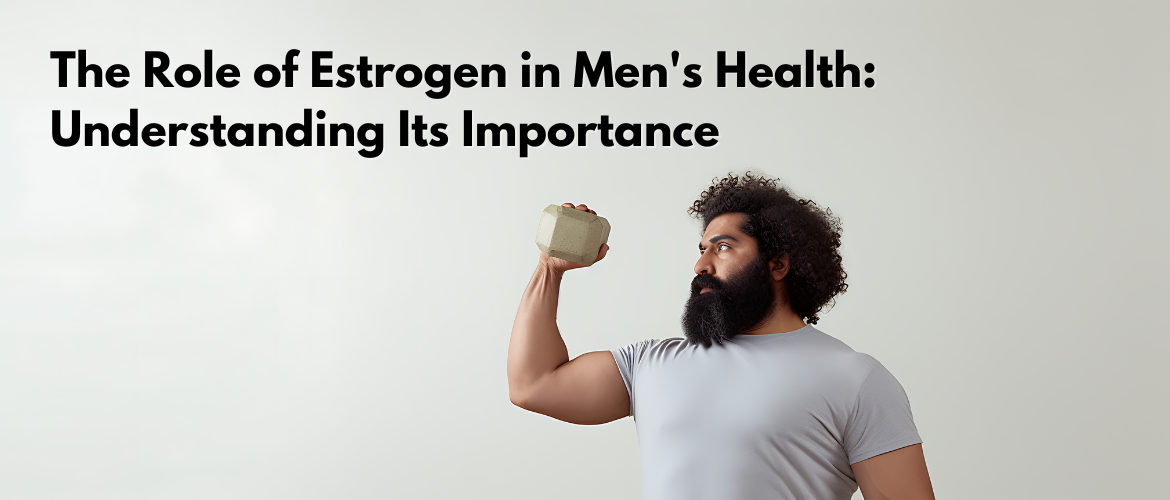No products in the cart.
The Role of Estrogen in Men’s Health: Understanding Its Importance

Introduction: Estrogen—Not Just a Female Hormone
When we hear the word estrogen, we often associate it with women’s health and reproductive function. However, what many people don’t realize is that men also have estrogen, and it plays a vital role in various physiological processes. While testosterone is the primary male sex hormone, estrogen helps regulate important functions such as brain health, bone density, heart health, and even sexual function.
In this blog, we’ll explore the role of estrogen in men, how it impacts their health, what happens when estrogen levels are too high or too low, and how to maintain a proper hormonal balance for overall well-being.
1. What Is Estrogen & Why Is It Important for Men?
Defining Estrogen
Estrogen is a group of hormones responsible for development and regulation of reproductive and metabolic processes. While it is more dominant in women, men also produce small amounts of estrogen, primarily through the conversion of testosterone via an enzyme called aromatase.
Types of Estrogen in Men
Men produce three main types of estrogen:
- Estradiol (E2) – The most biologically active form, crucial for brain and bone health.
- Estrone (E1) – Present in small amounts, mainly converted from androstenedione.
- Estriol (E3) – Less significant, plays a minor role in men’s health.
Though estrogen exists in lower concentrations in men compared to women, it is essential for overall health and must remain balanced to prevent complications.
2. The Vital Roles of Estrogen in Men’s Health
1. Brain Function & Cognitive Health
Estrogen plays a neuroprotective role, supporting memory, focus, and emotional stability. Research suggests that optimal estrogen levels help reduce the risk of cognitive decline, depression, and anxiety in men.
2. Bone Density & Skeletal Strength
Estrogen is critical for bone health, preventing osteoporosis and maintaining strong bones. Low estrogen levels can lead to weak bones, fractures, and an increased risk of osteoporosis, especially in aging men.
3. Cardiovascular Health
Estrogen contributes to heart health by improving blood vessel function and cholesterol regulation. It helps maintain vascular elasticity, reducing the risk of atherosclerosis, hypertension, and heart disease.
4. Sexual Function & Libido
While testosterone is the primary hormone driving sexual function, estrogen plays a role in maintaining libido, erectile function, and sperm health. Both testosterone and estrogen must be in balance for optimal reproductive health.
5. Fat Metabolism & Body Composition
Estrogen influences fat distribution and metabolism. Elevated estrogen levels can contribute to weight gain, fat accumulation (especially in the chest and abdomen), and reduced muscle mass in men.
3. Effects of Too Much or Too Little Estrogen in Men
Signs of High Estrogen in Men
Excess estrogen can lead to:
- Gynecomastia (enlarged breast tissue)
- Water retention and weight gain
- Low libido and erectile dysfunction
- Mood swings and irritability
- Fatigue and reduced muscle mass
Causes of High Estrogen in Men
- Obesity – Increased body fat raises aromatase enzyme activity, converting more testosterone into estrogen.
- Poor diet – Excess processed foods, soy products, and alcohol can disrupt estrogen levels.
- Environmental exposure – Chemicals called xenoestrogens found in plastics, pesticides, and personal care products can mimic estrogen in the body.
- Liver dysfunction – The liver helps metabolize excess estrogen; dysfunction can lead to buildup.
Signs of Low Estrogen in Men
A deficiency in estrogen can result in:
- Reduced bone density and fractures
- Cognitive decline and memory issues
- Depression and mood instability
- Fatigue and muscle weakness
- Sexual dysfunction
Causes of Low Estrogen in Men
- Age-related decline – Estrogen levels naturally decrease with aging, especially after 40.
- Hormonal disorders – Conditions like hypogonadism affect estrogen balance.
- Overuse of aromatase inhibitors – Medications blocking estrogen conversion can lead to deficiency.
4. How to Maintain Healthy Estrogen Levels in Men
1. Optimize Nutrition for Hormonal Balance
Diet plays a crucial role in regulating estrogen levels:
- Increase cruciferous vegetables (broccoli, cauliflower, cabbage) to aid estrogen metabolism.
- Consume healthy fats (avocados, olive oil, nuts) to support testosterone production.
- Reduce processed foods and excess sugar to prevent hormonal imbalances.
2. Maintain a Healthy Weight
Lower body fat reduces testosterone-to-estrogen conversion, ensuring balanced hormone levels.
3. Exercise Regularly
Strength training and high-intensity workouts help optimize estrogen balance by boosting testosterone levels and improving metabolism.
4. Reduce Exposure to Environmental Estrogens
- Avoid plastic containers, opting for glass or stainless steel.
- Choose organic foods to limit pesticide exposure.
- Use natural personal care products, avoiding endocrine-disrupting chemicals.
5. Consult a Doctor for Hormonal Testing
If experiencing symptoms of hormonal imbalance, seeking medical advice for an estrogen level test can help diagnose and correct issues early.
5. Frequently Asked Questions About Estrogen in Men
1. Can Men Take Estrogen Supplements?
Estrogen supplementation is rarely necessary for healthy men but may be prescribed in specific medical conditions.
2. Does Estrogen Affect Muscle Growth?
Excess estrogen can reduce testosterone levels, making muscle-building harder. However, balanced estrogen supports recovery and joint health.
3. Do Testosterone Boosters Help Lower Estrogen?
Some testosterone boosters can reduce testosterone-to-estrogen conversion, but excessive use may cause hormonal imbalances.
4. How Can I Naturally Lower My Estrogen Levels?
- Exercise and strength training
- Maintain a healthy weight
- Eat hormone-balancing foods
- Reduce exposure to xenoestrogens
Final Thoughts: Understanding Estrogen’s Role in Men’s Health
While testosterone often gets all the attention in men’s health, estrogen plays a vital role in maintaining bone strength, brain function, heart health, and metabolic balance. Keeping optimal estrogen levels ensures better physical, mental, and sexual well-being.
Key Takeaways:
✅ Men need estrogen for brain, bone, and cardiovascular health.
✅ Too much estrogen leads to weight gain, mood swings, and libido issues.
✅ Low estrogen can cause bone weakness, fatigue, and cognitive decline.
✅ Balanced nutrition, exercise, and weight management help regulate estrogen levels.
By understanding and managing estrogen levels, men can enhance their overall health, longevity, and vitality.
Start your wellness journey today — Visit Unike Nutra Now
Follow us
Facebook – https://www.facebook.com/profile.php?id=61567462823245
Instagram – https://www.instagram.com/unikenutra/
Twitter – https://x.com/Unikenutra
LinkedIn: https://www.linkedin.com/company/unike-nutra/
Amazon: https://www.amazon.com/stores/UnikeNutra/
Buy Now:






